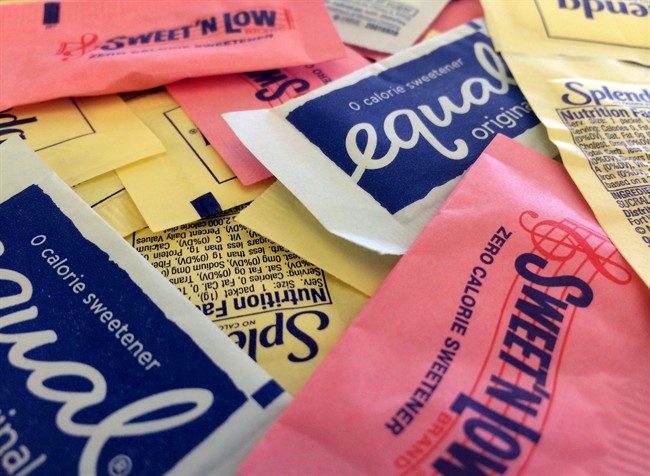Studies on artificial sweeteners are usually about how the chemicals are tied to overeating and weight gain but new research suggests that saccharin could hold the key to developing new drugs to fight difficult-to-treat cancers.

American scientists say they’re investigating whether saccharin – the main ingredient in Sweet ‘N Low and Sugar Twin – could be used against aggressive cancers. It’s a different way to look at the controversial sugar substitute that was once banned in Canada and other parts of the world for its alleged carcinogenic risk.
“It never ceases to amaze me how a simple molecule, such as saccharin – something many people put in their coffee everyday – may have untapped uses, including as a possible lead compound to target aggressive cancers,” Dr. Robert McKenna, of the University of Florida, said.
“This result opens up the potential to develop a novel anti-cancer drug that is derived from a common condiment that could have a lasting impact on treating several cancers,” he said.
READ MORE: Is diet soda adding to your belly fat?
McKenna zeroed in on how saccharin may be able to bind to and deactivate carbonic anhydrase IX – it’s a protein that influences the growth and spread of some aggressive cancers. It helps to regulate pH levels in and around cancer cells so that tumours can thrive and move to other parts of the body.
Carbonic anhydrase IX isn’t typically found in healthy human cells, but it’s tricky because it’s so similar to other proteins that our bodies rely on. Finding a therapy that blocks the IX protein without affecting the others hasn’t been easy.
McKenna’s hope is to develop saccharin-based drugs that would slow the development of these cancers while making them more susceptible to chemotherapy and radiation.
READ MORE: Why diet soda may be making you eat more
He’s focusing on saccharin because previous research – out of Italy and Australia – pointed to the chemical’s ability to stall carbonic anhydrase IX’s influence on cancer. Saccharin seemed to be able to stop the protein in its tracks without affecting the other proteins vital to our survival.
McKenna’s research is in its early stages: he’s now trying to understand why saccharin binds to the protein and how to manipulate the sugar substitute to play up its anti-cancer treatment potential. He’s looking into it on breast and liver cancer cells.
If there is hope, he says experiments could lead to animal studies.
READ MORE: Sweeteners create cocaine-like addictions: Canadian study
It’s been said time and time again: dieters turning to diet soda, and other products made with sugar substitutes, end up compensating for those zero-calorie drinks by eating more. It could be by justifying a second helping of dinner because they saved the 165 calories they would have got from a can of Coke. Or, say, eating two cookies at break if they opted for a diet beverage at lunch instead of a latte.
Other research has even pointed to artificial sweeteners disrupting the brain’s sensors and feelings of satisfaction. The jury’s still out on how these chemicals tamper with our health and how our bodies process the ingredient.
Saccharin is one of the oldest artificial sweeteners. It’s used in baked goods, chewing gum, drinks and even products like toothpaste and mouthwash.
READ MORE: Coke changes recipe; Pepsi still contains cancer-causing chemical, U.S. watchdog says
In the 1970s, studies surfaced that tied saccharin to bladder cancer in rats. By 1977, Canada banned the chemical as a food additive while the U.S. government warned that it could cause cancer.
Ultimately, the findings were disproved – the link didn’t exist in humans. By 1999, the International Agency for Research on Cancer concluded that saccharin shouldn’t be considered a carcinogen.
Health Canada quietly allowed saccharin back into the fold in 2014.
READ MORE: Could sugar substitutes cause diabetes?
McKenna’s full findings were presented Monday at the American Chemical Society’s national meeting in which 11,000 scientists join to report the latest in medical advances.
A press conference about his findings will be held on Tuesday at 3:30 Mountain Time. You can watch live here.
carmen.chai@globalnews.ca
Follow @Carmen_Chai




Comments